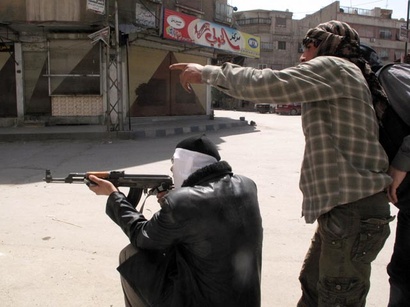US, Germany criticize Russia over Syria arms

German Foreign Minister Guido Westerwelle, who spoke at a joint press conference with Kerry in Washington, said the delivery of weapons to al-Assad`s regime was "totally wrong."
Washington and Moscow unveiled earlier in May a plan to bring both Damascus and the opposition to the negotiating table to bring to an end Syria`s 26-month-old conflict, which the United Nations estimates has killed at least 80,000 people.
A Russian arms industry source Friday denied that the advanced anti-aircraft missile systems had been delivered to the Syrian regime, while the MIG corporation confirmed the sale of 10 fighter jets to Damascus.
The denial, made by an unnamed source quoted by Russia`s Interfax news agency, came after Syrian President Bashar al-Assad was reported to have said that the first batch of S-300 missiles had already arrived in his country.
The source said the shipment times for four missile systems destined for Syria have not been confirmed.
The Kommersant daily, also citing an unnamed source, reported that the delivery was planned for the second quarter of 2014.
Yuri Ushakov, President Vladimir Putin`s chief foreign policy aide, declined to comment on these reports. He merely said Moscow was fulfilling its obligations and would not deliver any internationally banned weapons.
MIG chief executive officer Sergei Korotkov told reporters outside Moscow that the company was selling more than 10 of its fighter jets to Syria.
Korotkov added that the MIG-29MM2 jets would be delivered according to a contract and that a Syrian delegation was currently in Moscow to sort out the details.
Various media had reported on al-Assad`s missiles comments, which were taken from excerpts of an interview given to Lebanon`s al-Manar TV channel.
The Lebanese al-Akhbar newspaper quoted him as saying: "Syria has received the first batch of Russian S-300 anti-aircraft missiles."
However, when the interview was aired late Thursday, that exact quote was absent.
When asked whether the S-300 anti-aircraft missiles shipment arrived in Syria, al-Assad said: "All of our agreements with Russia will be implemented, some have been implemented during the past period and, together with the Russians, we will continue to implement these contracts in the future."
Russia is Syria`s key ally and arms supplier.
In New York, the UN Security Council approved sanctions against the al-Nusra Front, a jihadist rebel group fighting in Syria, because of the organization`s links to al-Qaeda, a spokesperson for the Australian mission to the UN told.
The sanctions committee, chaired by Australian Ambassador Gary Quinlan, placed the group on a blacklist designated for al-Qaeda-related individuals and entities.
Under the sanctions, the group will face an arms embargo, see its bank accounts frozen, and face travel bans for members of the organization.
In Syria, government troops, backed by fighters with the Lebanese Hezbollah group, were intensifying attacks to recapture the strategic rebel-held town of al-Kussair near the Lebanese border, said opposition and state media.
The opposition Syrian Observatory for Human Rights reported that dozens of gunmen had infiltrated the town to back rebels there, despite a siege by al-Assad`s troops.
Syria`s state news agency SANA, quoting an unnamed official source, said government troops had killed and injured an unspecified number of insurgents who attempted to infiltrate al-Kussair from Lebanon.
Syrian troops have battled rebels for more than a week to regain control of the town, which lies near a major highway connecting the Syrian capital, Damascus, with the government-controlled cities of Tartous and Latakia. The rebels use the area to smuggle weapons from Lebanon.















































